- Home
- Leslie Meier
Irish Parade Murder Page 7
Irish Parade Murder Read online
Page 7
“You made good time,” he said, extending his hand. He was a tall, good-looking man in his late fifties, dressed in a conservative suit, starched white shirt, and striped tie that matched his bright blue eyes. His dark hair was graying at the temples, and his cheeks were ruddy. A bag of golf clubs was propped in the corner.
“Not much traffic,” said Lucy, taking his hand and finding it strong and warm. “I beat the lunch rush.”
“So what can I do for you? Mortgage? Home equity line?” He winked, gesturing for Lucy to sit and taking his own seat. “Or is about my being a candidate for grand marshal of the St. Patrick’s Day parade?”
“You spoiled my surprise,” said Lucy, taking the visitor’s chair and getting right down to business. “I am here to ask why you would be the best choice for grand marshal, and what you think your chances are.”
“Pretty good, I’d say. A lot of people owe me,” he said, grinning. “Well, owe the bank. But I listened to their stories and made the loans, sometimes taking a bit of a risk, but having faith that my customers would make good.” He paused, tenting his hands. “And they have. I’m proud of what this bank has done for the community, and the Irish-American community in particular. We Irish have been quite successful, if I do say so myself.”
“In what way?” asked Lucy. “Do you mean the Kennedys?”
“Well, not everyone can be president, but you could say that the Irish have been one of the most successful, perhaps the most successful, of all the immigrant groups that have come to the shores of our melting-pot nation.”
Lucy nodded, writing it down in her notebook. “But you did have two advantages, no? Being white and speaking English.”
“True,” he admitted. “But there was terrible discrimination against the Irish when they first came here, and no wonder. The folk who fled the famine were desperately poor and lacked everything, including social graces. But they worked hard, and the women, especially, were determined to improve their lot. My grandmother is a good example. She arrived in America just before the Depression and got hired as a skivvy, a kitchen worker for a wealthy family, but she was a quick study and ended up a parlor maid. She lived to a grand old age, and believe me, when we visited, we had to be on our best behavior and dressed in our finest bib and tucker. She gave each of her grandkids five dollars on their birthdays, and woe betide the hapless child who forgot to write a proper thank-you note.”
“That does sound like Rose Kennedy,” said Lucy.
“Granny loved all the Kennedys. She had plates of JFK and Jackie on her mantel, and she had a special fondness for Ethel. All those babies, you know.”
“Did she have a big family?”
“No, she married late. Just had time to produce my mother, who she made sure went to college and became a teacher.”
“And you became a bank president,” added Lucy.
“My siblings are also successful. My sister is a CPA, and my brother is a lawyer. And my family’s story is pretty typical.”
“So for you the parade is a celebration of the success Irish-Americans have enjoyed in this country?”
“And the contributions they’ve made; don’t forget that,” said Ryan. “We’ve prospered, but we’ve also served in the armed forces and as first responders, as teachers and nurses. It was JFK, you know, who said, ‘Ask not what your country can do for you; ask what you can do for your country.’ We’ve done a great deal, sacrificed a lot, and we weren’t always appreciated.”
“Thankfully, times are changing,” said Lucy, with a smile. “Nowadays it seems that everybody’s Irish on St. Patrick’s Day, whether they really are or not.”
“Well, you don’t have to be Irish to enjoy a Guinness,” he said, with a grin and a wink. “The more the merrier, that’s what I say.”
“Ah, you’ve stepped into my trap,” said Lucy, with a sly grin. “What do you think of the Hibernian Knights’ decision not to let Rosie Capshaw march in the parade with her very fabulous puppets, including St. Patrick and Mother Jones?”
He shrugged his broad shoulders. “I understand Miss Capshaw makes marvelous creations, and I’m sure there will be many opportunities for her to display them. As for the Hibernians, they’re a private club, and they’re entitled to make their own rules. I don’t always agree . . .”
“So you don’t agree,” said Lucy, pouncing.
“I didn’t say that.” Ryan looked her straight in the eye. “I said I don’t always agree with the Hibernian Knights’ decisions, especially their tendency in the past to exclude those they didn’t approve of . . .”
“Why don’t you say it? Their racist behavior? As a banker, you’re forbidden by law to discriminate against people; you have to use the same standard for everyone.”
“True. But the Hibernian Knights are a private organization, and they get to decide who marches in their parade. And if you ask me, they’ve done a mighty fine job through the years putting on a grand show for folks to enjoy. It’s a shame that everything these days is political; people are always looking to criticize. Now, really, what’s the matter with watching some marching bands and dancing girls? What’s the matter with honoring our armed forces and our first responders?”
“Nothing at all,” said Lucy, judging from his spirited defense of the Hibernian Knights that James Ryan was definitely going to be chosen grand marshal. She closed her notebook and stood up. “And thank you so much for your time. It’s been a pleasure.”
Ryan was immediately on his feet, extending his hand across the desk. “A pleasure for me, too, and I hope this is only the first of many conversations.”
Lucy took his hand, finding it strong and warm. Reassuring somehow. Ryan was a decent man, a good man, she thought, as she left the bank. The thing that bothered her was why he was so reluctant to stand up for the things he believed in. Why was he making excuses for the Hibernian Knights?
* * *
Lucy didn’t get back to the office until the next morning, when she was surprised to discover that Rob was sitting at Phyllis’s desk behind the reception counter. “Where’s Phyllis?” she asked, trying to remember the last time Phyllis had missed a day of work. And what was Rob doing, taking her place?
“She’s taking her husband to the eye doctor this morning. He needs a ride home because of those drops; at least that’s what I was told.” Rob didn’t sound convinced; he sounded like a man with a grievance.
“It’s true about the eye drops,” said Lucy, setting her bag down on her desk and shrugging out of her barn coat. She looked at him curiously. “Weren’t you using Ted’s desk?”
“Yeah, but there’s something the matter with his PC, so I moved over here.” He furrowed his brow. “Did you think I was demoted or something?”
“No,” said Lucy, who had wondered if Ted was yanking Rob’s chain, although she doubted he would be so petty. “Actually, it wouldn’t be a demotion. Phyllis gets the news first; she knows everything that’s going on.”
Rob stiffened in his seat. “Well, I’m only sitting here because Ted’s computer is on the fritz.” He screwed up his mouth. “Actually, the hardware in the place is practically antique. He ought to use some of the grant money to upgrade.”
“Fat chance,” said Lucy, seating herself. “He’ll keep them going until they disintegrate.” She pressed the power button and was relieved when her PC responded with its usual series of groans and pings. She checked her emails, then flipped open her notebook, eager to get started on the grand-marshal story. She knew it wasn’t exactly the scoop of the century, but she wanted to write a solid story that would prove once and for all that she was a top-notch reporter. She knew she wasn’t perfect—there was probably room for her to improve, and there were most likely things that Rob could teach her—but she did want to make it clear that she deserved to be treated with respect. She was trying out a couple of different leads when Rob spoke up.
“Uh, Lucy, what’s the deal with Wilcox and Marzetti?” he asked, naming two long-time selectmen.
“What do you mean?”
“They don’t seem to like each other much.”
“Really?” Lucy was puzzled. “I never noticed that.”
“At the meeting last night, Wilcox got all huffy when Marzetti said something about him being out of touch.”
“That doesn’t sound like Tony,” said Lucy.
“And then that woman . . .”
“Franny Small?”
“I guess that’s her name. You gotta wonder what she brings to the board . . .”
“Franny brings a wealth of experience. She’s retired now, but she created and managed a million-dollar company, all on her own.”
“Are you serious?”
“Yeah. She started making jewelry out of nuts and bolts when she worked at a local hardware store. It was good timing—punk was all the rage—and her stuff took off. She never looked back.”
“She doesn’t seem to have much to say . . .”
“She’s like E. F. Hutton.”
“Who?”
Kids today, thought Lucy, with a sigh. “It was a commercial a while ago. ‘When E. F. Hutton talks, people listen. ’”
“Well, anyway, they didn’t seem to do much of anything at the meeting . . .”
This was a shock to Lucy. “Didn’t they approve the budget?”
“Oh, that. It was just a quick vote.”
“It’s a big story. It’s the town budget for next year. You’ve got to get a copy. You’ve got to write it up so voters will be prepared when they go into town meeting.”
“The whole budget?”
“Yeah. Right down to the penny.”
He groaned and pushed his chair back. “I can’t believe it.”
“You better believe it, and you better get on it. Fast. I heard the School Committee was asking for a big increase, and if the selectmen approved it, well, that’s going to be controversial. To say the least.”
“I’m not really a numbers guy,” he began, reaching for his jacket. “I’m more into issues and personalities . . .”
“Go! Now! Straight to Town Hall. Get the budget!”
“Aye, aye, captain.” Rob saluted and marched to the door, but Lucy saw through the window that as soon as he was outside, his back drooped and his walk slowed. It seemed that local news wasn’t really all he’d hoped it would be.
Chapter Seven
When Lucy finished writing up her notes from the two interviews, she saw it was time for her appointment with the third grand-marshal candidate, Brendan Coyle. She was looking forward to her meeting with Coyle, whom she’d interviewed several times in the past regarding his work as director of the local food pantry, and she had always come away with the encouraging belief that all must be right in the world if it could contain such a good-hearted soul as Brendan Coyle.
Aware that she was running a bit late, she was tempted to speed, but thought better of it when she noticed one of the deputy sheriff’s vehicles behind her. It wasn’t necessarily following her, she told herself; most likely, they were simply both headed in the same direction. Nevertheless, she felt somewhat relieved when she reached the Gilead church that housed the food pantry and turned into the parking area, and the deputy continued on down the road.
Exiting her car, she walked along the cement path to the church basement, passing the last of the afternoon’s clients, who were toting heavy bags of groceries home. Lucy knew that the pantry’s client list kept growing longer, despite the booming national economy that had somehow never arrived in small towns like Gilead and Tinker’s Cove. Jobs were few in the coastal community, and pay was low and often irregular, as people juggled several jobs in an effort to make ends meet in what was largely a seasonal tourist economy. Observing a young mom who was toting a baby on her back and pushing a stroller loaded with a toddler and several bags of groceries, she was reminded how the lack of reliable and affordable child care complicated matters for working parents, who had to rely on aging grandparents or kind-hearted neighbors to keep an eye on the kids while they were on the job.
Stepping inside, it took a moment for her eyes to adjust to the dim interior light, but there was no mistaking Brendan Coyle. He was a big man, well over six feet, with broad shoulders, a big belly, and a booming voice. “Over here, Lucy,” he boomed, waving her toward the former Sunday school classroom that now served as a storage space for the pantry. A row of long tables held the day’s offerings, mostly picked over now, and Coyle was packing up the remainders to store for another day.
“Peanut butter, tomato soup, elbow macaroni, and day-old bread,” he muttered, shaking his head. “I wish we could give these folks some fresh fruits and vegetables. We do get donations in the summer from people’s gardens, mostly zucchini and tomatoes, but this time of year, it’s nothing but sprouting potatoes and mushy onions.” He held up a floppy bunch of carrots. “Fit for nothing but soup.”
“I saw some of your clients leaving,” said Lucy, “and nobody was complaining.”
“Well, maybe they should,” declared Brendan. “Maybe it’s time for some resistance, some demonstrations . . .”
“Whoa,” laughed Lucy. “That sounds like rabble-rousing, and that will never do for the St. Patrick’s parade grand marshal.”
Brendan laughed as he pulled out a chair for Lucy and one for himself. “Take a load off, Lucy. You’re looking tired, and it’s only a bit past noon.”
“My days are a lot busier, now that Ted’s bought the Gabber. Plus we’ve got that new guy . . .”
“The one who’s supposed to show you how it’s done,” said Brendan, with a wink.
“Yeah,” sighed Lucy. “He needs a lot of help and takes up a lot of my time. I’m not sure it’s a net gain, if you know what I mean.”
“I suspect I do,” said Brendan. He looked around the classroom, where a few boxes of groceries remained on the tables. “I love the volunteers, I need the volunteers, but sometimes it seems they’re more trouble than they’re worth.” He grinned. “Some are absolute gems, always on time, ready to pitch in, but others, oh my word. ‘Well, I can’t make it this week because I’ve got to see my podiatrist, and my cousin is coming . . . I hope it’s not a problem for you.’ ”
“So I suppose,” began Lucy, flipping open her notebook, “that if you are chosen grand marshal, it would be an opportunity for you to promote your social programs. The food pantry, the annual Walk to End Hunger and Prevent Homelessness, the recovery groups . . .”
“Indeed,” agreed Brendan. “And I have to say that the Hibernian Knights, as well as the Irish-American community at large, have always been very generous, very involved in helping those who need a hand up. They haven’t forgotten how tough things were for their grandparents; we Irish have long memories.”
“So for you it’s that tradition that’s most important. It’s not necessarily being a practicing Catholic, or being against abortion?”
“Do you know they just voted two to one in the Irish Republic to legalize abortion? In Ireland, where they used to lock up the poor unwed mothers in convents and make them virtual slaves, laboring endlessly in laundries and such.”
“I do know, and I’ve also heard that there is no St. Patrick’s Day parade in Ireland. It’s apparently an American thing.”
“True,” agreed Brendan, with raised eyebrows and a sharp nod. “I guess nothing makes the heart grow fonder than absence. I often wonder how much these fervent Irish-Americans would really make of the new Ireland, with no border to speak of between the North and South, and old grievances put aside.” He shrugged. “For the moment, anyway.”
“I guess prosperity makes it that much easier to forget the troubles,” ventured Lucy.
“Knowing the Irish, it will all bubble up again.” He sighed. “Those long memories, and the authors and journalists who insist on revisiting the past.”
“Don’t blame me. I’m not one for digging up old skeletons,” protested Lucy. “So tell me when the next walk is scheduled, and how folks can sign up, and I�
��ll put in a plea for food-pantry donations, maybe ask for a volunteer gardener or two . . .”
“Great idea, Lucy. There’s space here behind the church for a garden. It would be great if we could grow our own. I bet some of the clients would be happy to dig in, no pun intended.”
“And it would be a teaching opportunity for your clients, so they could plant their own gardens.”
“I think there’s a bit of the community organizer in you, Lucy.”
Lucy laughed and closed her notebook. “No way, I’ll leave that to you,” she said, standing up. “You do a much better job. And good luck with the grand marshal . . .”
“Oh, I don’t expect to be chosen, but I’m grateful to be considered.” He stood up and walked Lucy to the door, which he opened and held for her. Taking a look at the sky, he grimaced at the dark clouds that were piling up, darkening the day. “Best get straight home. Looks like a storm’s a-brewing.”
“It sure does,” said Lucy. “I know they say that if you don’t like the weather in Maine, you should wait a minute, but don’t you think it’s gotten even more unpredictable lately?”
“Climate change.” Brendan shook his head. “Don’t get me started.”
“Thanks for the interview,” said Lucy, giving him a little wave as she hurried off to her car. The wind was picking up and blew her hair every which way, and she had to struggle against it to open the car door. Once inside, she smoothed her hair, deciding not to go back to the office but to head straight home, via a shortcut that she knew. With luck she’d be safe at home in ten minutes.
The road she had in mind ran in a mostly direct line through the county forest preserve, and it was well-maintained, but was only partially paved at either end. Most of the road was gravel, and it was sometimes closed to traffic in winter. It had only reopened recently, with the warning that some patches could be muddy, due to the recent thaw, but a sudden spattering of raindrops on her windshield convinced her that it was worth the slight risk. If she took the usual route on the highway, it would take at least half an hour to get home, even longer in heavy traffic now that it was getting on to five o’clock. And besides, she had new tires, and her car had all-wheel drive and could easily handle an unpaved country road.

 Christmas Card Murder
Christmas Card Murder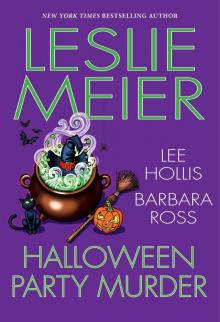 Halloween Party Murder
Halloween Party Murder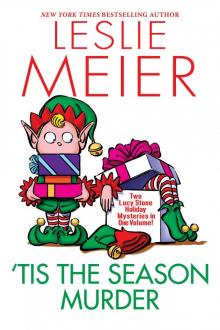 'Tis the Season Murder
'Tis the Season Murder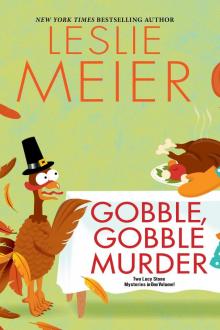 Gobble, Gobble Murder
Gobble, Gobble Murder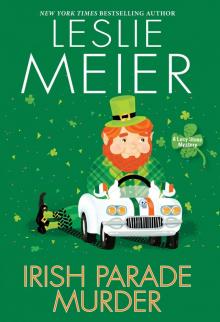 Irish Parade Murder
Irish Parade Murder Bake Sale Murder
Bake Sale Murder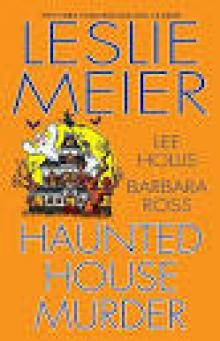 Haunted House Murder
Haunted House Murder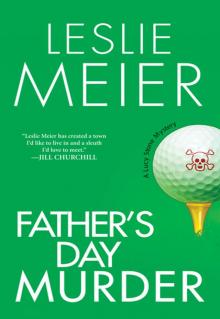 Father’s Day Murder
Father’s Day Murder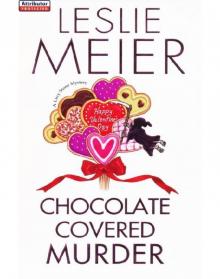 Chocolate Covered Murder
Chocolate Covered Murder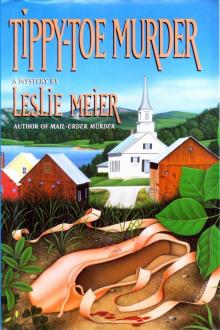 Tippy Toe Murder
Tippy Toe Murder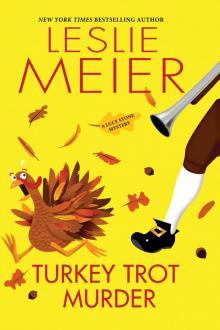 Turkey Trot Murder
Turkey Trot Murder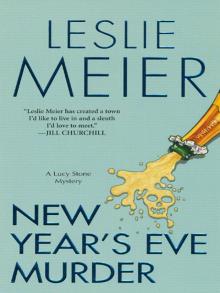 New Year's Eve Murder
New Year's Eve Murder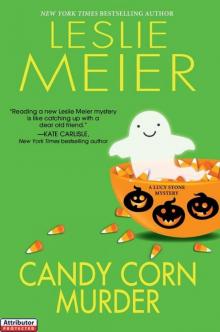 Candy Corn Murder
Candy Corn Murder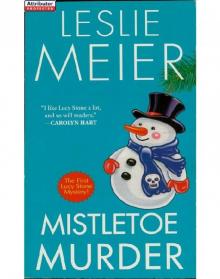 Mistletoe Murder
Mistletoe Murder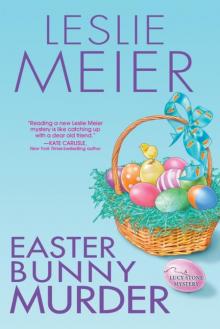 LStone 20 - Easter Bunny Murder
LStone 20 - Easter Bunny Murder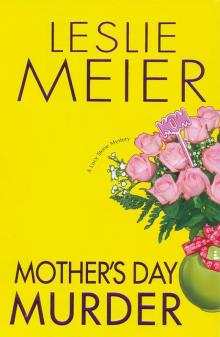 Mother's Day Murder
Mother's Day Murder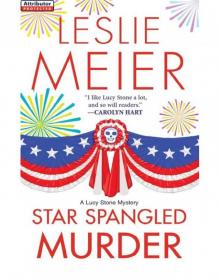 Star Spangled Murder
Star Spangled Murder Silver Anniversary Murder
Silver Anniversary Murder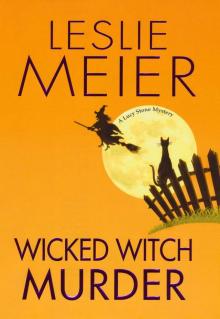 Wicked Witch Murder
Wicked Witch Murder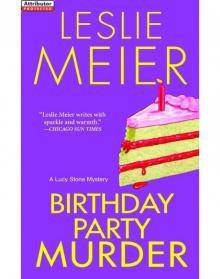 Birthday Party Murder
Birthday Party Murder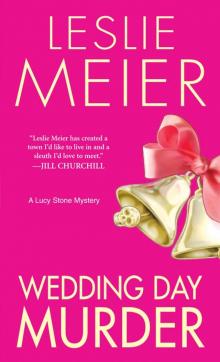 Wedding Day Murder
Wedding Day Murder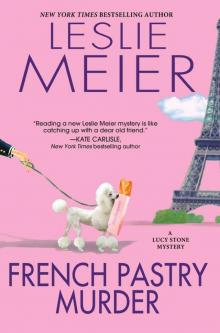 French Pastry Murder
French Pastry Murder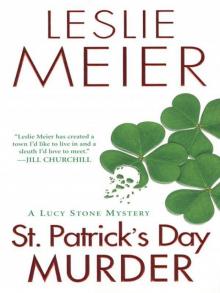 St. Patrick's Day Murder
St. Patrick's Day Murder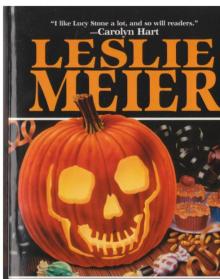 Trick or Treat Murder
Trick or Treat Murder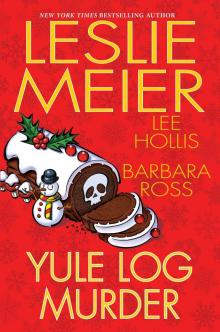 Yule Log Murder
Yule Log Murder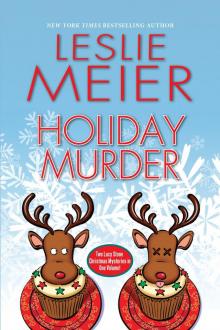 Holiday Murder
Holiday Murder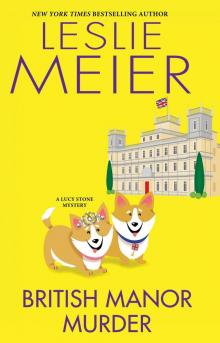 British Manor Murder
British Manor Murder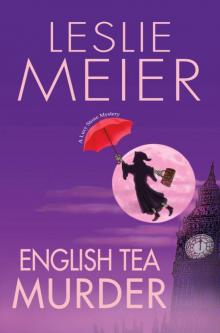 English Tea Murder
English Tea Murder